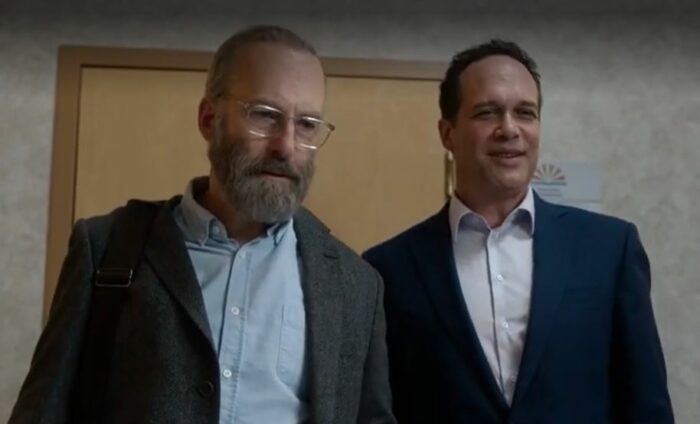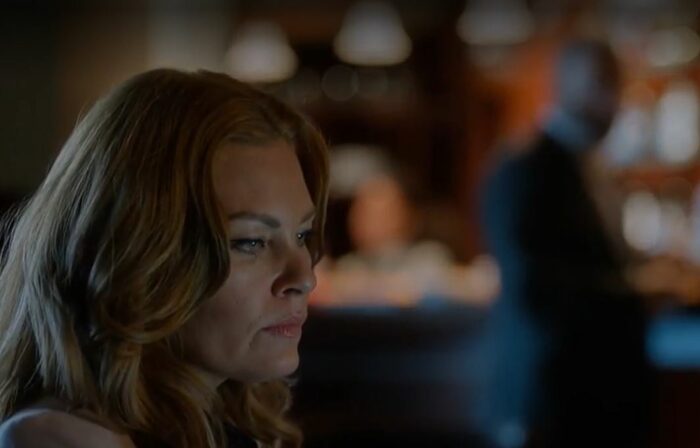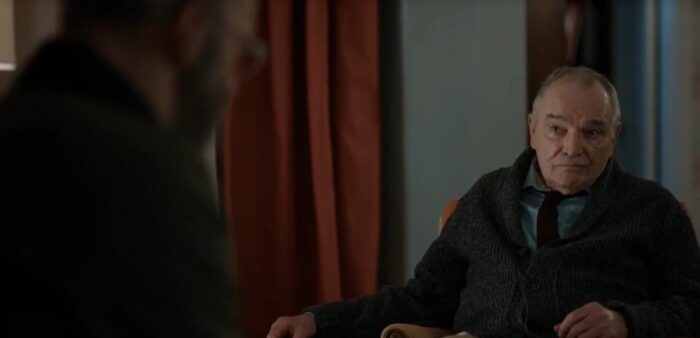The following recap contains spoilers for Lucky Hank S1E6, “The Arrival” (written by Jasmine Pierce and directed by Jude Weng)
Long-awaited confrontations between estranged fathers and sons have long been a staple of television and film. Whether it’s Luke Skywalker and Darth Vader, Star-Lord and Ego, or The Fresh Prince and his runaway father Lou, father and son relationships (or their lack of relationships) can be one of the most impactful story drivers on screen. In the sixth episode of Lucky Hank, “The Arrival,” Hank Devereaux finally has the opportunity to confront his father, William, about his abandonment issues and why he left him and his mom. But what has been building up to a huge bang ends up instead just landing in heartbreak.
It all begins when Hank sets up a late-night stakeout to confirm that yes, in fact, his father has finally retired, arrived in town, and has set up residence with Hank’s turncoat mother. Hank still wants nothing to do with him, wants to never see him, and is ignoring his mother’s calls about trying to get the two of them together (from this scene I now have a new favorite line to use when someone asks me why I haven’t been answering their calls: “because my caller ID works”). Lily, Hanks’s wife, steps up to his defense despite the humiliation he caused her at the dinner party in Episode 5’s “The Clock.” Hank is committed to an out-of-town academic conference in Harrisburg and can’t make it to see his dad through the entire weekend.
Hank’s mother Laurel (played coldly by Anne Gee Byrd), delivers an ultimatum that doesn’t quite make sense given the context of the last five episodes, but will inevitably serve as the MacGuffin of the episode. She says William has informed her that he will move to North Carolina after the weekend because of the hurtful voicemail Hank left William, telling him that he wasn’t welcome in Railton. Could William feel hurt by this? Of course. But could William as an old, dependent retiree really pivot his plan to move to another state in such a short period of time? Of course not. But it provides Hank and the viewers a ticking clock that he has to watch if he wants to have the long-coming confrontation with his dad.

The academic conference, which Hank attends with Tony, ends up being the first in a series of things Hank chooses to do that he would never, in any parallel universe, choose to do if the alternative did not involve speaking with his father.
He attends the conference, which he considers to be a joke. He gets a massage, actually letting another human he does not know to touch him. Hank shares a hot tub with a 50s-something couple who have no problem when their chewed-up Oreo crumbs fall into the water. He stops by colleague Susie’s panel presentation on poetry in the 21st century. He goes to a party with conference-attenders where he has to (gasp!) socialize and make small talk. He approaches an attractive literary colleague and attempts some of the worst pick-up lines since Ross told Caitlin that he “happens to like eight-year-old boys.”
It’s in this interaction that the U-turn for Hank begins. This academic peer, it turns out, was a graduate student at Columbia at the same time Hank’s father was a thesis advisor there. Hank knows that “thesis advisor” has to be code for “forbidden affair” and awkwardly pushes the issue. She all but confirms that his assumptions are true, and asks “do you want something from me?” While she surely means money, reparations, or confirmation, all Hank wants is affirmation. “Did he mention he had a son? Did he express any affection or have any fond memories of me?”
The words that Hank has never been able to say to his father come spilling out to a woman he just met, but her only piece of advice is both the one thing that Hank needs to hear, and the one thing he never wants to do: “You should talk to him.”

After the conversation with his dad’s old fling, Hank escapes by hanging out in the hotel’s gym/arcade area. What starts out as Hank running on the treadmill in full professor attire ends with him befriending a young boy who’s playing foosball. Their montage together gives Hank a small glimpse of what a healthier father-son relationship would have been like. But even the good moments have consequences for someone like Hank. In all of his effort to escape, time slipped away and he missed Tony’s academic presentation.
While it was easy to dismiss the words of a stranger for Hank, even though it might be someone that played a part in the performance that led to Hank’s lifelong misery, it’s a conversation with Tony, Hank’s oldest and best friend, that removes any doubt that the right thing to do is to confront his dad. Angered that the presentation went horribly, that he was professionally discredited, but most of all that his friend was not there to support him, Tony finally speaks his truth to Hank.
“You’ve detached yourself from pretty much everything you care about. Every year you care about less, and you’re more depressed. I just don’t see why.”
Hank puts up his normal defensive fortification, but the words have cut him deeply. We know why he is more and more depressed. By the time he gets home on Sunday, Hank has decided to take the advice his colleague Susie gave to her peers at the conference (“slurp the marrow out of life!”). He admits to Lily (who spent the weekend mediating a marital dispute between their daughter Julie and her husband Russell about, among other things, how often Russell masturbates) he must talk to his father.
I was a bit confused by the timing of this important confrontation. By the time Hank walks into his mother’s apartment to speak to his father there are less than five minutes left in the episode. That tells us the viewers that someone’s short fuse is going to blow up this conversation or we will be left with a cliffhanger of sorts from one of them.
In reality, neither of those takes place. When we have face-to-face conversations, it doesn’t take long to realize that the person sitting across from you is not the person you expected to be talking to. After Hank wants to cut through all the glib “bullshit” about William’s retirement and Hank’s research, it only takes a moment for Hank to learn that his father’s memory is gone. Williams talks about Hank like he is not 12 inches from his face, he talks about the book tour he will take on his next sabbatical, and about how the humidity where they are now living in Florida is horrible for old books.

Bob Odenkirk has done some masterful acting with his face during this season, but these few seconds might be the pinnacle. What goes through someone’s mind when they learn that after agonizing and stewing over something for 25 years, there can be so resolution and no absolution? What does one feel when all they ever wanted in life was some affirmation and affection from their father, but that man can’t recognize them even though they’re close enough to touch? This entire gambit of emotions washes over Hank as he realizes the man he hates and the man that has guided his thoughts and decisions for two decades can’t be confronted.
The way this scene is cut, we continue to hear the conversation between the two men but see Hank walk out to his car. I love this decision because we are left wondering a number of things. How long did Hank stay there? What is Hank’s response to his father essentially being a different person? Could Hank actually prefer this scenario, knowing he never has to truly ask his father why he abandoned them right after Hank attempted suicide?
For almost three decades, Hank’s life has been identified by Tony’s words that Hank is becoming more and more depressed. Can someone like Hank actually live a different, more fulfilled life even if his father had remorsefully apologized for the indiscretion and abandonment? Would he even want to? Hank’s decision to speak with his father corresponded with a conversation he had with Lily about finally wanting to think about moving to New York so she can take the new job she was offered.
Does the Hank who never gets to have closure from his father actually want to leave Railton and become a new person? We have two episodes left in this season to find out, but my money is on the old Hank taking over. The monumental event of his father’s arrival could actually mean nothing changes at all.

